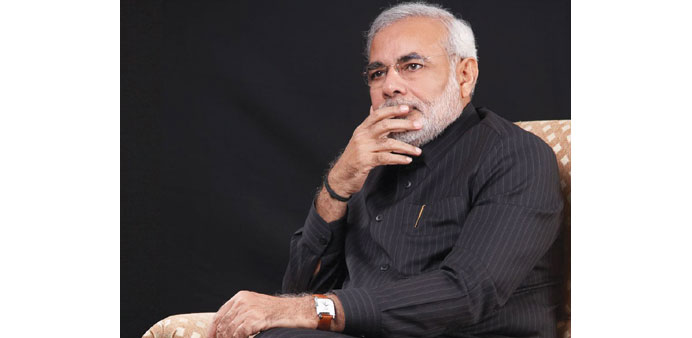Modi: Won about $160bn in pledges for loans and investment from global companies.
Bloomberg
New Delhi
Indian Prime Minister Narendra Modi needs to invest $200bn in seven years to clean India’s filthy air, cut greenhouse gases and build wind and solar farms. Issuance of more than $1bn of green bonds has been a welcome first step.
IDBI Bank this week became the nation’s third issuer of notes whose proceeds will be used for clean energy projects, raising $350mn from overseas investors. Demand was almost triple that amount even as global green bonds gained just 0.78% through October, compared with 6.2% a year earlier, in a Bank of America Merrill Lynch index.
Modi’s 2022 investment target supports his plan to steer the world’s second-most populous nation’s dependence on fossil fuels toward renewable sources. About 70% of the outlay will be funded by debt, according to clean energy researcher Mercom Capital Group. Global green bond issuance is expected to surpass $40bn this year, about 10% more than in 2014, according to Moody’s Investors Service.
“The potential for green bonds in the country is tremendous,” NS Venkatesh, Mumbai-based chief financial officer at IDBI Bank said in a phone interview on November 24. “IDBI has a pipeline of about $2bn for funding eligible green projects.” Mumbai-based Yes Bank issued India’s inaugural green bond in February to raise Rs10bn ($150mn), followed by a Rs3.2bn private sale in August, according to data compiled by Bloomberg. State-controlled Export-Import Bank of India offered the first dollar-denominated issuance in March to raise $500mn. IDBI’s sale makes India the second-largest issuer of green bonds behind Australia in the Asia-Pacific region, where a total of $4.2bn have been offered. The lender received about $1bn of orders for its five-year bond sale at a yield premium of 255 basis points more than US Treasuries. That compares with average spreads of 296 basis points for all Indian issuers, according to JPMorgan Chase & Co indexes.
Others are beefing up the green bond pipeline. NTPC, India’s largest electricity producer, is seeking central bank approval for a planned $1bn sale of global notes, its finance director said in September. Yes Bank is returning to green bonds with a $500mn note to be listed on the London Stock Exchange next year.
“Green bonds have an appetite globally as funding renewable energy initiatives is seen mitigating challenges posed by global warming and climate change,” said Ajeet Agarwal, New Delhi-based finance director at Rural Electrification Corp, the third- biggest issuer of rupee bonds this year.
At the climate talks in Paris next week, developing nations are looking for Modi to champion their interests in winning funds to mitigate the worst effects of climate change. Richer countries including the US are wary India could end up scuttling any deal. While a new website is providing round-the- clock updates on “Green India,” Modi has set a target for reducing emissions that’s so low that the world’s third-largest polluter will meet it without committing to anything new. The summit is also an opportunity for Modi to claim his spot among the world’s top statesmen. By making 32 overseas trips since taking office in May 2014, he has won about $160bn in pledges for loans and investment from global companies of all kinds. That’s more than $8bn a month on average, which may give environmental issuers and investors optimism for the long-term. “I see green bond issuance picking up in 2016,” Nirav Dalal, Mumbai-based group president and senior managing director for financial markets at Yes Bank said in a phone interview on November 24. “The ability and willingness of banks to finance and build up more green assets will be the driver for future
issuance.”

